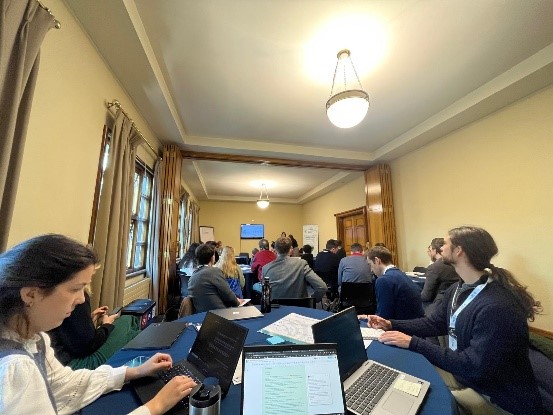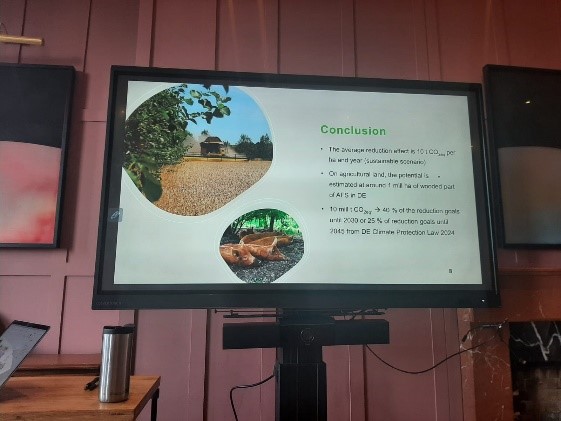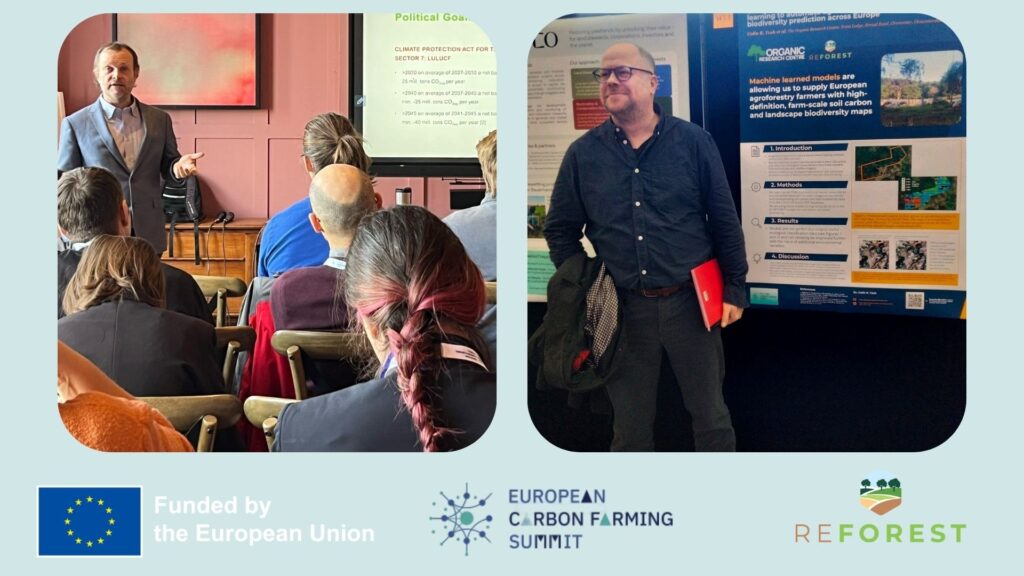Koolstoflandbouw ontwikkelt zich snel als een belangrijk instrument voor klimaatactieen agroforestry wordt nu formeel erkend in de EU-kaderverordening voor certificering van koolstofverwijdering (2024/3012). Het waarborgen van geloofwaardige, transparante en praktische methodologieën voor Monitoring, rapportage en verificatie (MRV) blijft een van de grootste uitdagingen voor koolstofmarkten en beleidsimplementatie.
Om bij te dragen aan het vormgeven van dit kader heeft ReForest een actieve rol gespeeld in de Europese koolstoflandbouwtop (4-6 maart 2025, Dublin), dat diende als een belangrijk platform voor het afstemmen van wetenschap, beleid en praktijkervoor zorgen dat koolstoflandbouw echte voordelen oplevert voor boeren, het milieu en de maatschappij in het algemeen.
ReForest bij de MRV-workshop
Vertegenwoordigd door Dr. Rico Hübner van DeFAFReForest nam deel aan de workshop over MRV van agroforestry koolstoflandbouwsystemen. De sessie bouwde voort op de EURAF typologie van agroforestrysystemen en onderzocht hoe je koolstofverwijdering kwantificeren, implementeren en in stand houden binnen het bredere kader van regeneratieve landbouw.
Dr. Rico Hübners presentatie over het evalueren van koolstofopslag in bodem en biomassa De presentatie versterkte een cruciale boodschap van de top: om de klimaatvoordelen van landbouw te maximaliseren, moeten koolstofmonitoringmethodes gestandaardiseerd, schaalbaar en kosteneffectief zijn.
De inzichten die tijdens de discussies gegenereerd worden, zullen bijdragen aan komende EURAF Policy Briefings op agroforestry en koolstoflandbouw, vormgeven aan de volgende fase van EU-beleidsontwikkeling.
Het meten van de Co-baten van Agroforestry: Posterpresentatie van Colin Tosh
Als onderdeel van de postersessieReForest leverde een belangrijke bijdrage aan het gebruik van teledetectie en machine learning om MRV-systemen voor agroforestry te verbeteren. De poster van Colin Tosh toonde modellen voor machinaal leren, getraind op multispectrale satellietbeelden, waarmee het in kaart brengen van organische koolstof in de bodem en biodiversiteit op Europese agrobosbouwbedrijven kan worden geautomatiseerd.
Dit onderzoekswerk binnen het ReForest-project pakt een van de belangrijkste economische en technische barrières in de koolstoflandbouw aan: de hoge kosten van MRV-activiteiten. De technologie is toegepast op ReForest Living Lab boerderijen, waar het een kosteneffectieve, schaalbare oplossing biedt voor boeren, onderzoekers en beleidsmakers die de koolstofvoordelen van agroforestry willen beoordelen.
De poster onderstreepte ook de bredere rol van agroforestry in ecologische regeneratie. Naast koolstofvastlegging helpen de modellen bij het bijhouden van biodiversiteitswinsten, een aspect dat vaak over het hoofd wordt gezien in koolstofmarkten.
Tijdens de hele top was een terugkerend thema de behoefte aan een systemische aanpak naar koolstoflandbouw. Zoals de organisatoren van Project Credible samenvatten, is koolstoflandbouw niet alleen over koolstof - Het gaat om de transformatie van de landbouw naar meer regeneratieve, veerkrachtige en duurzame praktijken. De sociale, economische en milieudimensies moeten allemaal in aanmerking worden genomen, en agrobosbouw bevindt zich in een unieke positie om deze aspecten te overbruggen.
Er werd echter ook erkend dat er blijven belangrijke hiaten bestaan in de ontwikkeling van beleid voor koolstoflandbouw en het succes van koolstoflandbouw uiteindelijk afhangt van het feit of boeren die het land beheren.
ReForest blijft toegewijd ervoor te zorgen dat agroforestry een centrale rol speelt in de Europese strategie voor koolstoflandbouw en zet zich in voor geïntegreerde benaderingen die de volledige waarde van agroforestry.
Downloaden De presentatie van Dr. Rico Hübner over de evaluatie van bodem en biomassa
Downloaden Colin Tosh's poster over het automatiseren van de voorspelling van organische koolstof in de bodem en biodiversiteit
Downloaden Vergelijkende kwantificering van koolstofvoorraden in diverse productiesystemen.
Downloaden Abstracte poster van de Koolstoflandbouwtop Albert M. Colom Bauza - UCPH.


